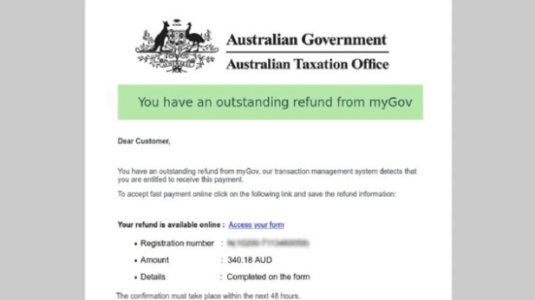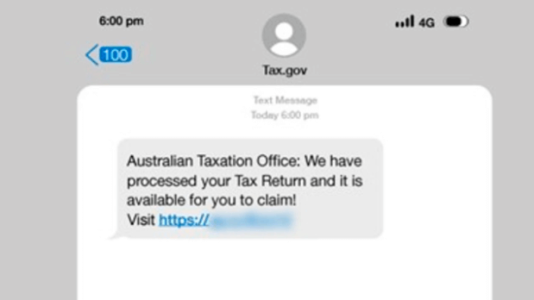Scam alerts: Australians urged to stay cautious as ATO notes surge in phishing and impersonation cases
- Replies 23
In today's world, more and more people have experienced some kind of data breach that exposed their personal information.
This has resulted in cybercriminals gaining access to confidential data and causing problems, from identity theft to financial loss.
That's why it's becoming more important for everyone to proactively protect their data. We must keep our guard up these days, and the warning signs of a scam should not be overlooked.
The Australian Tax Office (ATO) has recently raised concerns by warning about a significant rise in reports of impersonation scams.
Specifically, SMS and email scams target unsuspecting Australians to steal their usernames and passwords.

Typically, these fraudulent missives are presented as messages from the Australian Taxation Office (ATO), urging the recipient to click on a hyperlink within the message. Unfortunately, this directs them to a fake myGov sign-in page, where they might unwittingly surrender their vital information. As the ATO has warned, this could prove disastrous for parties that do not remain vigilant.
'We won't send you an SMS or email with a link to log on to online services,' ATO notes on its website.
'While we may use SMS or email to ask you to contact us, we will never ask you to return personal information through these channels. Our services should be accessed directly by typing ato.gov.au or my.gov.au into your browser.'
That's not the only warning coming from the ATO, however.
You may have also noticed 'official-looking' text messages, seemingly from the ATO, which advise recipients that they have Centrelink payments ready to claim.
The ATO stresses that if recipients click on the link in the message, they will not only be unable to claim their payment, but they may also jeopardise their personal information by doing so and expose it to scammers.
The government agency has made it clear that it has been receiving an undue number of increased reports of scams since tax time and that many of these scam messages lure unsuspecting people in with phrases such as:
According to Scamwatch, over $25.7 million has already been lost to phishing and identity theft scams this year.
The ATO has warned that if you receive any suspicious communication or requests claiming to be from the government agency itself, you should delete it and report it to [email protected].
These cases emerged just a few months after the Australian Communications and Media Authority (ACMA) issued a warning about a scam targeting mobile numbers and email addresses, putting people at risk of identity theft.
One text message urged people to click a link to view a 'pay message'. The message encouraged the recipient to open their myGov inbox, but not everything was as it seemed.
To read more about this case, click the link here.

We hope we’ve given you insight into how important it is for us to think smart and stay safe online.
Here at the SDC, we always recommend that you research legitimate government websites carefully to ensure you are on the right track. The more informed you are, the fewer chances you have of getting scammed!
What are your thoughts, members? Have you received any similar messages or emails recently? What did you do about them? Share your experiences with us in the comments section below!
This has resulted in cybercriminals gaining access to confidential data and causing problems, from identity theft to financial loss.
That's why it's becoming more important for everyone to proactively protect their data. We must keep our guard up these days, and the warning signs of a scam should not be overlooked.
The Australian Tax Office (ATO) has recently raised concerns by warning about a significant rise in reports of impersonation scams.
Specifically, SMS and email scams target unsuspecting Australians to steal their usernames and passwords.

Australians are being urged to remain vigilant after a spike in reports of impersonation scams. Credit: ATO.
Typically, these fraudulent missives are presented as messages from the Australian Taxation Office (ATO), urging the recipient to click on a hyperlink within the message. Unfortunately, this directs them to a fake myGov sign-in page, where they might unwittingly surrender their vital information. As the ATO has warned, this could prove disastrous for parties that do not remain vigilant.
'We won't send you an SMS or email with a link to log on to online services,' ATO notes on its website.
'While we may use SMS or email to ask you to contact us, we will never ask you to return personal information through these channels. Our services should be accessed directly by typing ato.gov.au or my.gov.au into your browser.'
That's not the only warning coming from the ATO, however.
You may have also noticed 'official-looking' text messages, seemingly from the ATO, which advise recipients that they have Centrelink payments ready to claim.
The ATO stresses that if recipients click on the link in the message, they will not only be unable to claim their payment, but they may also jeopardise their personal information by doing so and expose it to scammers.
The government agency has made it clear that it has been receiving an undue number of increased reports of scams since tax time and that many of these scam messages lure unsuspecting people in with phrases such as:
- 'You are due to receive an ATO Direct refund',
- 'You have an ATO notification',
- 'Update personal details to facilitate the processing of a tax return',
- 'Verify an incoming tax deposit',
- 'ATO Refund failed due to incorrect BSB/Account number', and
- 'Due to receive a refund, click here to receive a rebate'.
According to Scamwatch, over $25.7 million has already been lost to phishing and identity theft scams this year.
The ATO has warned that if you receive any suspicious communication or requests claiming to be from the government agency itself, you should delete it and report it to [email protected].
These cases emerged just a few months after the Australian Communications and Media Authority (ACMA) issued a warning about a scam targeting mobile numbers and email addresses, putting people at risk of identity theft.
One text message urged people to click a link to view a 'pay message'. The message encouraged the recipient to open their myGov inbox, but not everything was as it seemed.
To read more about this case, click the link here.
Key Takeaways
- The Australian Tax Office (ATO) has warned Australians to stay vigilant due to increased impersonation scams, especially with the new financial year.
- Most of these scams aim to steal crucial personal information, such as usernames and passwords, through phishing, where the individuals receive an email or SMS with a hyperlink leading to fake myGov sign-in pages.
- ATO also warns Australians to delete text messages claiming they have Centrelink payments ready to claim.
- According to Scamwatch, there has been a reported loss of over $19m to phishing scams and more than $6.7m to identity theft scams this year, but the total amount is likely higher as not all losses are reported.
We hope we’ve given you insight into how important it is for us to think smart and stay safe online.
Here at the SDC, we always recommend that you research legitimate government websites carefully to ensure you are on the right track. The more informed you are, the fewer chances you have of getting scammed!
What are your thoughts, members? Have you received any similar messages or emails recently? What did you do about them? Share your experiences with us in the comments section below!








